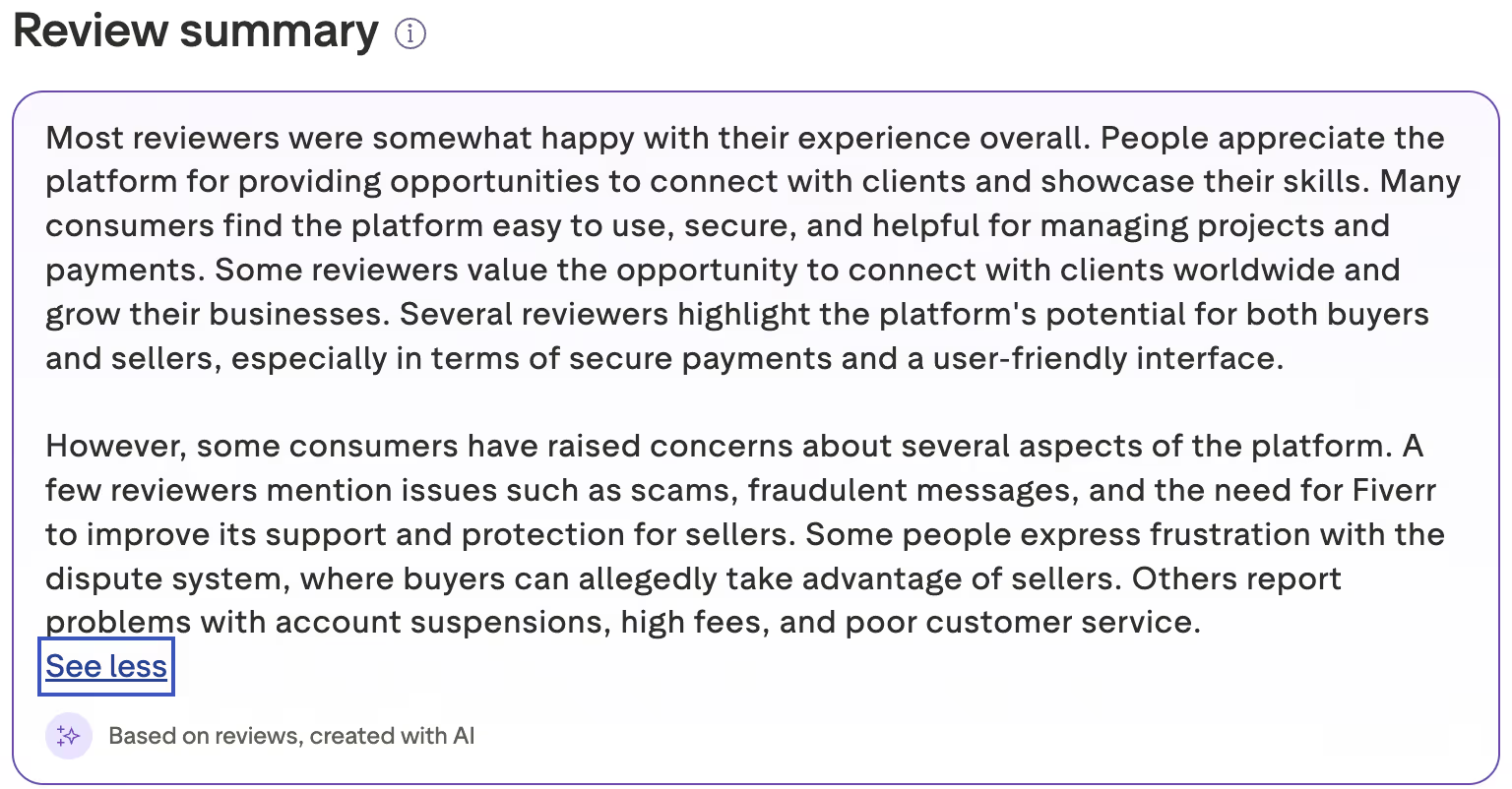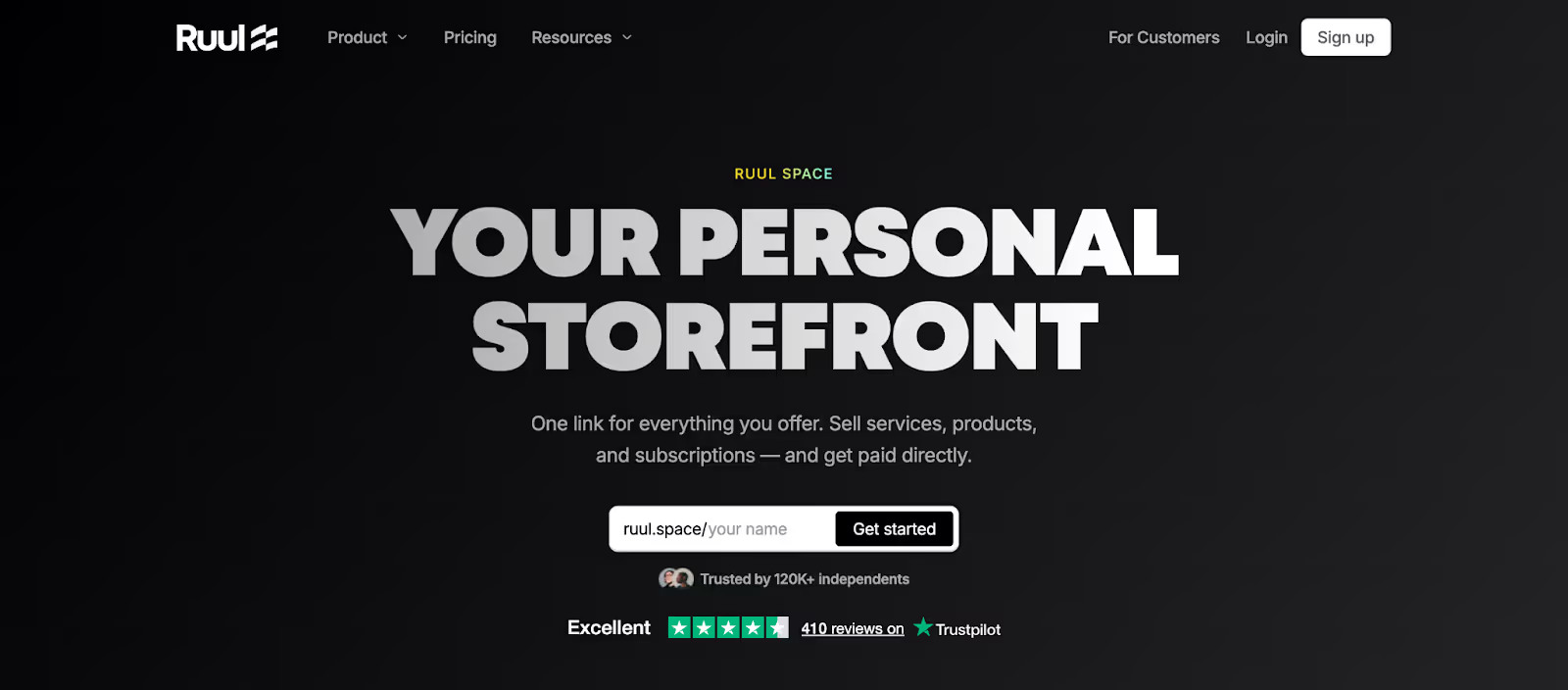Thinking about freelancing on Fiverr? It’s one of the biggest marketplaces out there, but size doesn’t mean safety. Spam accounts, shady clients, and scam attempts still lurk in the mix.
Here’s the deal: Fiverr is legit, but it pays to stay sharp.
This guide shows you the red flags to watch and the steps to protect your freelance work.
Is Fiverr legit? The short answer
Yes, Fiverr is a legitimate platform. It’s been around since 2010, is publicly traded on the New York Stock Exchange, and connects freelancers with businesses worldwide.
According to Trustpilot, Fiverr holds a rating of around 3.5/5 based on 16K reviews, with many praising its ease of use while others warn about spam and disputes.
Here is the AI summary of reviews on Trustpilot.

This summary confirms its legitimacy but also highlights the scale at which scams can occur.
Here’s the catch: Legitimacy doesn’t mean scam-free. Just like on social media, spam accounts and bad actors exist.
Fiverr has systems in place to protect freelancers, but staying safe requires awareness and some proactive steps on your end.
But if safety is your priority, I recommend that you learn about Merchat of Record platforms.

Common risks independents face on Fiverr
Let’s start with what you need to be aware of. When you know the risks, it’s easier to identify them.
- Scam clients: Fake buyers may ask you to start work before placing an order, or request free samples.
- Payment issues: Even with Fiverr’s escrow system, disputes can delay your payout.
- Spam accounts: Automated or fake profiles send irrelevant offers, wasting your time.
- Phishing & data theft: Suspicious links or requests for login/bank details can put your security at risk.
- Exploitative offers: Some clients try to underpay, asking you to work for “exposure” instead of fair compensation.
What are spam accounts on Fiverr?
Spam accounts are fake or malicious profiles created to trick freelancers. They often show up in your inbox with shady offers or copy-paste messages.
Red flags to watch for:
- Generic greetings like “Hello dear” with no project details.
- Requests to communicate on WhatsApp, Telegram, or email.
- Unrealistic budgets (“$500 for 2 hours of work”).
- Links to external websites or files that look suspicious.
Example of a common scam message:
"Hello dear, I have big project for you. Please contact me on WhatsApp quickly for details: +123456789"
Messages like this are a red flag—generic greeting, urgency, and pushing you off-platform. Engaging with these accounts can lead to wasted time, stolen work, or even account suspension if Fiverr detects you’re communicating outside the platform.
They can also act like Fiverr employees and ask for personal info. Know that Fiverr clearly states that they never contact users via inbox.

How to identify and avoid scams on Fiverr
Scams have their patterns that help us identify them. Thanks, guys.
Plus, there are some tips that will clear your space from the beginning.
Here’s how to protect yourself:
1) Write clear gig descriptions
A clear gig description helps clients understand your offer and keeps out scammers who thrive on vagueness.
Explain exactly what you offer, what’s included, and what’s not to prevent scope creep.
2) Use milestones for larger projects
Break big jobs into smaller deliverables so you get paid along the way. This protects you from scams by ensuring payment is released step by step instead of risking everything on a single final delivery.
3) Vet clients before accepting work
Check their reviews, order history, and communication style to avoid headaches. Doing this helps you spot fake or suspicious accounts before you waste time and shields you from scam attempts disguised as real projects.
4) Deliver files only through Fiverr
Protect yourself from disputes and avoid getting flagged for off-platform activity. This also keeps scammers from tricking you into sending work without payment or pulling you into unsafe channels where fraud is common.
5) Keep conversations professional and within the platform
Clear, respectful communication reduces misunderstandings and keeps you safe. It also prevents scammers from luring you into unsafe channels where fraud and identity theft are more common.
You do your best on your side. But as a legit business, sure, Fiverr also takes care of their users. See how:
Fiverr’s safety measures (and How They Help You)
Fiverr isn’t the wild west. It has built-in protections to keep freelancers safe:
Escrow payments:
Client funds are held in a secure system until the buyer approves the delivery. This prevents clients from disappearing without paying.
Dispute resolution:
If a disagreement arises, Fiverr offers a resolution center where both sides can present their case. This reduces the risk of being scammed by dishonest clients.
Verification systems:
Buyers and sellers may need to verify identities through official documents or payment methods, which filter out fake accounts and make scams harder.
Platform rules:
Fiverr enforces strict policies against off-platform payments and spammy behavior, helping freelancers avoid phishing attempts and fraud traps.
These measures make Fiverr safer than going solo, but they aren’t foolproof. Scammers always look for loopholes.
Pros and Cons of Fiverr
Let’s summarize what we talked about to help you decide if you will move to Fiverr or not.
Pros:
- Global reach with millions of buyers.
- Escrow system protects payments.
- Easy entry for beginners.
- Built-in dispute resolution.
Cons:
- High competition and pressure on pricing.
- Platform fees cut into earnings.
- Scam accounts and spam messages.
- Delayed withdrawals.
Who Fiverr works best for
Fiverr is generally a good fit for:
- Beginners building their first client base.
- Freelancers who want exposure to a global market.
- Budget-conscious buyers looking for affordable services.
Who might want to look elsewhere:
- Experienced freelancers seeking higher-value projects.
- Those tired of spam accounts and disputes.
- Professionals wanting faster, more flexible payments.
When to consider Fiverr alternatives
Fiverr can be a good starting point, but it’s not the only option. If you’re tired of:
- Waiting weeks to get paid,
- Losing money to high platform fees,
- Dealing with scam accounts and wasted time,
…it might be worth exploring Fiverr alternatives.
Or even creating another system to grow your freelance business.
Have your own page with a safe payment button. Even send an automatic invoice to your client when they click on “purchase”.
Wait, wait, don’t stop there: Enable subscriptions.
Ruul Space can do it all for you (for free).

With Ruul, you can:
- Sell services directly to clients anywhere in 190+ countries.
- Get paid 4x faster in 140+ currencies.
- Stay compliant with taxes and paperwork, without the admin headache.
- Even get paid in crypto if that’s your vibe.
Instead of depending on a marketplace’s rules, you set your own. Cool.
FAQs
Is Fiverr worth it?
Fiverr is legit and for many freelancers, it’s a great place to start. It’s best for beginners and those looking for quick gigs, but less ideal for established pros who want consistent, higher-value work. It comes with both opportunities and risks.
If you want more freedom, faster payments, and fewer platform headaches, tools like Ruul give you the control and security you need to truly work on your own terms.
Done with spam and delays? Take control of your work and get paid your way with Ruul—the independent’s pay button.
Can you really make money on Fiverr?
Yes. Thousands of freelancers earn a steady income on Fiverr. Success depends on your niche, pricing, and ability to stand out in a competitive marketplace.
How do I know if a Fiverr client is fake?
Look for red flags: no order history, vague requests, urgent messages pushing you off-platform, or unrealistic pay offers. Always check reviews and keep communication on Fiverr.
Is Fiverr safe for beginners?
Generally yes. Fiverr’s escrow and dispute systems protect new freelancers, but beginners must stay cautious about scam messages and underpriced offers.










